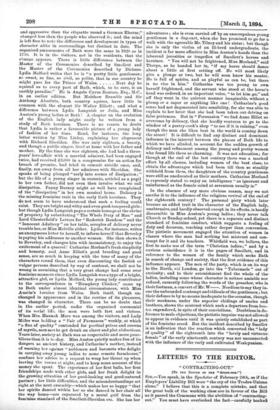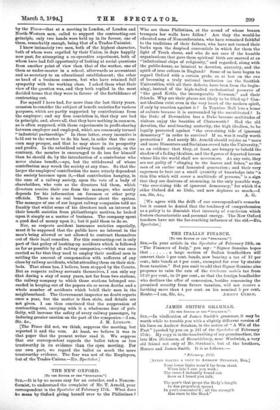LETTERS TO THE EDITOR.
"CONTRACTING-OUT."
[TO MI/1 EDITOR OF TH111 SPZOTATOZ."1 SIR,—You speak, in the Spectator of February 24th, as if the Employers' Liability Bill were "the cry of the Trades-Unions alone." I believe that this is a complete mistake, and that the great bulk of the working class are in favour of the Bill as it passed the Commons with the abolition of "contracting- out." You must have overlooked the fact—carefully barked by the Times—that at a meeting in London, of London and North-Western men, called to support the contracting-out principle, only two hands were held up in its favour, one of them, remarkably enough, being that of a Trades-Unionist.
I know intimately two men, both of the highest character, both of whom were expelled by their Union, in days happily now past, for attempting a co-operative experiment, both of whom have had full opportunity of looking at social questions from another point of view than that of the worker, one of them as under-master in a school, afterwards as accountant and as secretary to an educational establishment ; the other as head of a business concern, but who have retained full sympathy with the working class. I asked them what their view of the question was, and they both replied in the most decided terms that they were in favour of the forbiddance of contracting out.
For myself I have had, for more than the last thirty years, -occasion to consider the subject of benefit societies for various purposes, which are partly supported by contributions from the employer; and my firm conviction is, that they are bad in principle, and, above all, that they have nothing in common, as is often supposed, with those experiments in profit-sharing between employer and employed, which are commonly termed 4' industrial partnerships." In these latter, every incentive is field out to the worker to do his best, in order that the con- -cern may prosper, and that he may share in its prosperity and profits. In the subsidised railway benefit society, on the -contrary, the member is encouraged to do less for himself than he should do, by the introduction of a contributor who never claims benefit, —aye, but the withdrawal of whose -contribution may wreck the society at any time. So that the 'arger the employers' contribution the more utterly dependent the society becomes upon it,—that contribution hanging, in the case of a railway society, upon the vote of a body of shareholders, who vote as the directors bid them, which directors receive their cue from the manager, who mostly -depends for his information on foremen or other petty officials. There is no real benevolence about the system. The manager of one of our largest railway companies told me frankly that whilst some of his directors took an interest in their benefit societies from philanthropic motives, he looked 4ipon it simply as a matter of business. The company spent a good deal of money upon it; but it paid them to do so.
Nor, as respects accident insurance societies especially, must it be supposed that the public have no interest in the men's being allowed or not allowed to contract themselves -out of their legal remedies. For this contracting-out is only part of that policy of hushing-up accidents which is followed as far as possible by all railway companies,—which was once -carried so far that they used to employ their medical men in settling the amount of compensation with sufferers of any -class by railway accidents, whilst attending them on their sick- beds. That abuse has, I believe, been stopped by the Courts. But as respects railway servants themselves. I can only say that during a stay of many years, not far from two stations, =the railway company to which those stations belonged suc- ceeded in keeping out of the papers six or seven deaths and a whole number of accidents which befell their men in the neighbotulood. The Government inspector no doubt reports -once a year, but the matter is then stale, and details are not given. I am thus convinced that the suppression of contracting-out, carrying with it a wholesome fear of pub- Et:Hy, will increase the safety of every railway passenger, by 'inducing greater caution on the part of the companies.—I am,
[The Times did not, we think, suppress the meeting, but reported it and the vote. At least, we believe it was in -that paper that the present writer read it. We suppose that our correspondent regards the ballot taken as less trustworthy in its evidence than the open meeting. For our own part, we regard the ballot as much the more 'trustworthy evidence. The fear was not of the Employers, .bat of the Trades-Unions.—En. Spectator.]







































 Previous page
Previous page